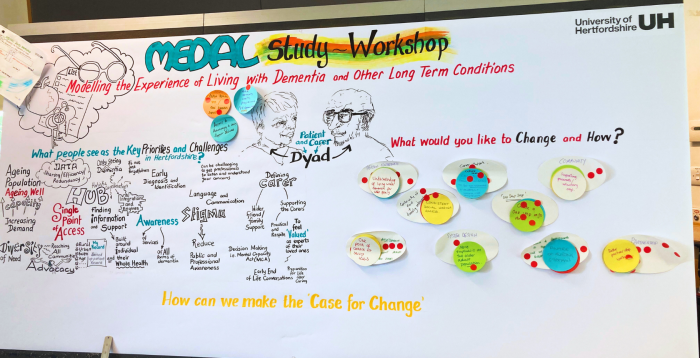Dr. Melanie Handley reflects on a workshop that aimed to build a shared vision for future research aimed at improving health and care services for people living and supporting someone with multiple long-term conditions, including dementia.
Dr. Mel Handley is a University of Hertfordshire researcher in the ARC East of England’s Support for Ageing and Living with Long Term Conditions theme and is the Joint Principal Investigator for the MEDAL project.
The workshop brought together commissioners of health and care services, clinical and professional staff, and people with lived experience of multiple long-term conditions to discuss challenges and solutions when using health and care services. In the workshop, I shared findings from work of engineers and mathematical scientists working with me on the MEDAL project, which was funded by the National Institute of Health and Care Research (NIHR) and Engineering & Physical Sciences Research Council (EPSRC).
The MEDAL project developed mathematical models that simulate the experiences of people living with multiple long-term conditions, including their living conditions, interactions with health and care services, and GP referrals to memory clinics. These models use anonymous information from health and care records to predict how changes to services, such as how people are prioritised for appointments, affect individuals, others using the service, and the service itself. This will help service commissioners and managers predict the impact of potential changes before they are implemented.
The workshop was attended by 21 people, including six who cared for someone with multiple long-term conditions, including dementia; 13 professionals working in health, care, and community services; and two service commissioners. Together, we discussed the priorities in Hertfordshire so we could understand research priorities to help shape the future focus of the MEDAL project. People living with or supporting someone with different long-term conditions that include dementia told us they find using health and care services frustrating, which makes them feel overwhelmed. This included struggles with appointment systems, finding the right person who could help, logistics when attending appointments, repeating information to multiple people, and having to make decisions about which advice to follow, particularly when it was conflicting or impractical.
“It is so important that we work closely with the communities who will benefit from our research. By talking with people who use and work in services we find out what matters most. This has helped us to design how we take the work of MEDAL forward so the work can make a positive difference and tackle the inequalities people experience from multiple long term conditions including dementia.”
Dr Mel Handley, Joint Principal Investigator of the MEDAL project
We found that the conversations echoed research highlighting these issues and offering recommendations for over 15 years, indicating that little progress has been made. It has long been known that better links between services and a person’s unpaid care partner will help people to more easily receive the support they need and are entitled to. However, the way health and care services are organised can make even small changes difficult.
Researchers on the MEDAL study include people with engineering backgrounds. They think about these challenges from a wide perspective and have tools to predict how changes will affect people and services when used in practice. During the workshop, we shared an example of the tools engineers use and explained how changes to services would be represented in the tools to predict benefits to people and services. People attending the workshop engaged with this approach and understood the potential of using health and care data for improving services.

Artwork from the MEDAL project discussion by Debbie Roberts, Engage Visually
An artist, Debbie Roberts from Engage Visually, joined the workshop and captured key points from discussions in a mural created during the event. The artwork (pictured above) illustrated the importance of easily accessible services for people with different conditions and caring responsibilities so that they can live as well as possible and have a good quality of life. Some of the solutions, such as having a ‘one-stop shop’ to help people find the support they need, were seen as common solutions by all attendees. Feedback from attendees showed how much they enjoyed and appreciated being part of the event. One person who cares for a family member commented:
“Seeing my words added to the mural during the meeting helped me feel listened to – I could see that my opinion mattered. Being in the same room as people who provide our services showed me that we all want things to change.”
MEDAL workshop participant
Collectively, attendees at the workshop identified key changes that would improve their health and wellbeing from improved health and care services. This included being able to access peer support and education soon after receiving a diagnosis, having a named person, such as a care navigator or admiral nurse, who can provide continuity as conditions change and progress, and being able to access services that anticipate uncertainties related to care and treatment plans for interacting conditions.
Although the workshop attendees had diverse sets of knowledge and experience, the inclusive and collaborative format encouraged openness and sharing for all participants. I shared the final artwork with members of the Red Shed in Stevenage, some of whom had attended the workshop. One person commenting that during the event she felt her voice and opinions mattered as much as those of those who worked in services. As we progress with this project, I will continue to work collaboratively with the variety of stakeholders to gather diverse perspectives.
You can hear more about the MEDAL study by contacting Dr Mel Handley via email m.j.handley@herts.ac.uk.
